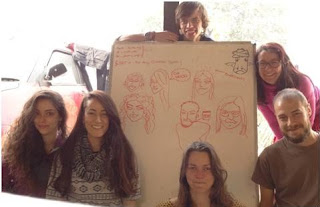January, the season for grafting has come! Back
from the holidays, we remembered a visit in October to Lajwanti Nursery, a
beautiful nursery in Dharamshala. The owner of the place, very friendly, had
offered to show us grafting when the season would come.
We called and were immediately offered t
 How nice to see the place again! Lajwanti Nursery
is a quiet place, owned by a passionate man who is always very keen to share
and discuss about his passion. Plants are everywhere! From the ground to the
walls, they are grown on every space available. Here is the ideal for anyone
who wants to learn: nearly all the trees are labeled with the local and the Latin
name.
How nice to see the place again! Lajwanti Nursery
is a quiet place, owned by a passionate man who is always very keen to share
and discuss about his passion. Plants are everywhere! From the ground to the
walls, they are grown on every space available. Here is the ideal for anyone
who wants to learn: nearly all the trees are labeled with the local and the Latin
name.
It is also well suited if you just want to
wander around. The nursery is very beautiful and full of flowers depending on
the season. A member of the family is passionate about animals so you can also
see some dogs, birds, etc., on your way.
The subject of the day was grafting. Naddi, the
village we are working in, is surrounded by the forest. We are planting some
trees on a steep slope and the inhabitants would be very interested in having
fruit trees. But the fruits that we can find there are really tiny and not very
good.
What we could do is use the local trees as stem
trees and graft a fruit tree branch on it.
The result: a tree adapted to the area because it
is local to it, with branches and big fruits from another tree! To do this you
need to pick up two trees of the same family (genius).So we learned how to do this properly and
grafted pear on “Kanth”: a local wild pear tree. There is a lot of “Kanth” in
Naddi so we can definitely reproduce this. We can also
graft Cherry on “Paja”: another local tree.
We should be able to see the result of the
grafts in about 2 weeks’ time. We will go there again to see if the graft went
well and to buy some trees to be able to begin our grafting process by next
year! We hope to be able to bring a community member with us so that she can
meet the owner of the place.
The owner is very enthusiastic and will be a
permanent help and contact for the organization!
Thank you Lajwanti Nursery and see you soon!
Louise Brunier and Johnatan de Larminat - France
Forestry Project Managers, Naddi (Himachal Pradesh)



























